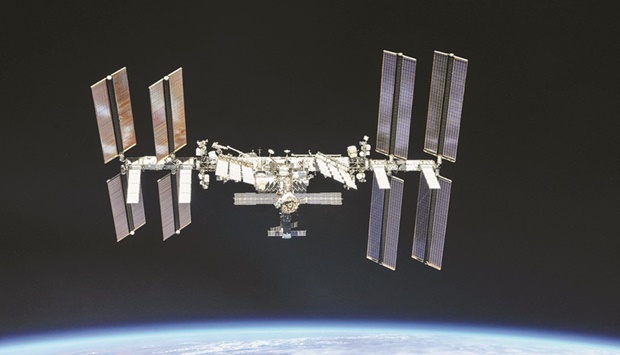The United States and Russia said yesterday that they would renew flights together to the International Space Station (ISS), preserving one of the last areas of co-operation amid Western attempts to isolate Moscow over the invasion of Ukraine.
“To ensure continued safe operations of the International Space Station, protect the lives of astronauts and ensure continuous US presence in space, Nasa will resume integrated crews on US crew spacecraft and the Russian Soyuz,” the US space agency said in a statement.
Nasa and Roscosmos, the two-decade-old space station’s core partners, have sought for years to renew routine integrated crewed flights as part of the agencies’ long-standing civil alliance, now one of the last links of co-operation between the United States and Russia as tensions flare over the war in Ukraine.
The two agencies had previously shared astronaut seats on the US shuttle and the Russian Soyuz spacecraft.
After the shuttle’s retirement in 2011, the US relied on Russia’s Soyuz for sending American astronauts to the space station until 2020, when SpaceX’s Crew Dragon capsule revived Nasa’s human spaceflight capability and began routine ISS flights from Florida.
The National Aeronautics and Space Administration (Nasa) said that astronaut Frank Rubio would fly with two Russian cosmonauts on a Soyuz rocket scheduled to launch on September 21 from Kazakhstan, with another astronaut, Loral O’Hara, taking another mission in early 2023.
In a first, Russian cosmonauts will join Nasa astronauts on SpaceX’s new Crew-5 which will launch in September from Florida with a Japanese astronaut also on the mission.
Another joint mission on the SpaceX Crew-6 will fly out in early 2023, Nasa said.
The move comes despite the European Space Agency earlier this week terminating its relationship with Russia on a mission to put a rover on Mars, infuriating Russian space chief Dmitry Rogozin who banned cosmonauts on the ISS from using a European-made robotic arm.
However, hours before Nasa’s announcement, President Vladimir Putin dismissed Rogozin, a firebrand nationalist and ardent backer of the Ukraine invasion who once quipped that US astronauts should get to the space station on trampolines rather than Russian rockets.
Roscosmos, the Russian space agency, said the agreement with Nasa was in the interests of both countries and “will promote co-operation” on space.
“The agreement seeks to guarantee that in the event of an emergency caused by the cancellation or major delay in a Russian or American space launch, at least one Roscomos cosmonaut and one Nasa astronaut will be present to service the Russian and American sections respectively,” it said.
The US space agency has said that having at least one Russian and one American aboard the station is crucial to keeping the laboratory running.
“Flying integrated crews ensures there are appropriately trained crew members on board the station for essential maintenance and spacewalks,” Nasa said in a statement yesterday.
The agency added that the ISS was set up for joint participation by the United States and Russia along with Europe, Japan and Canada.
“The station was designed to be interdependent and relies on contributions from each space agency to function. No one agency has the capability to function independent of the others,” Nasa said.
Soyuz rockets were the only way to reach the space station until SpaceX, run by the billionaire Elon Musk, debuted a capsule in 2020.
The last Nasa astronaut to take a Soyuz to the station was Nasa astronaut Mark Vande Hei in 2021.
He returned to Earth in March this year alongside Russian cosmonauts, also on a Soyuz.
Speaking to reporters afterward, Vande Hei said that the cosmonauts remained his “very dear friends” despite their nations’ tense relationship.
“We supported each other throughout everything,” he said. “And I never had any concerns about my ability to continue working with them.”
The United States has imposed sweeping sanctions on Russia after Putin on February 24 invaded Ukraine, defying Western warnings.
The sanctions, which include tough restrictions on financial interactions, have led to an exodus of leading US brands from Russia including Starbucks and McDonald’s.
However, the International Space Station is unique.
It was launched in 1998 at a time of hope for US-Russia co-operation following their space race competition during the Cold War.
The ISS is expected to wind down in the next decade.
Rogozin had warned that Western sanctions could affect co-operation.
“If you block co-operation with us, who will save the ISS from uncontrolled deorbiting and falling on US or European territory?” Rogozin wrote in a tweet earlier this year.
Kremlin spokesman Dmitry Peskov did not indicate that his removal meant Putin was unhappy with Rogozin.
One independent media outlet said he would be promoted and could be put in charge of occupied territories in Ukraine.

The International Space Station (ISS) is seen in this 2018 photograph by Expedition 56 crew members from a Soyuz spacecraft after undocking.
